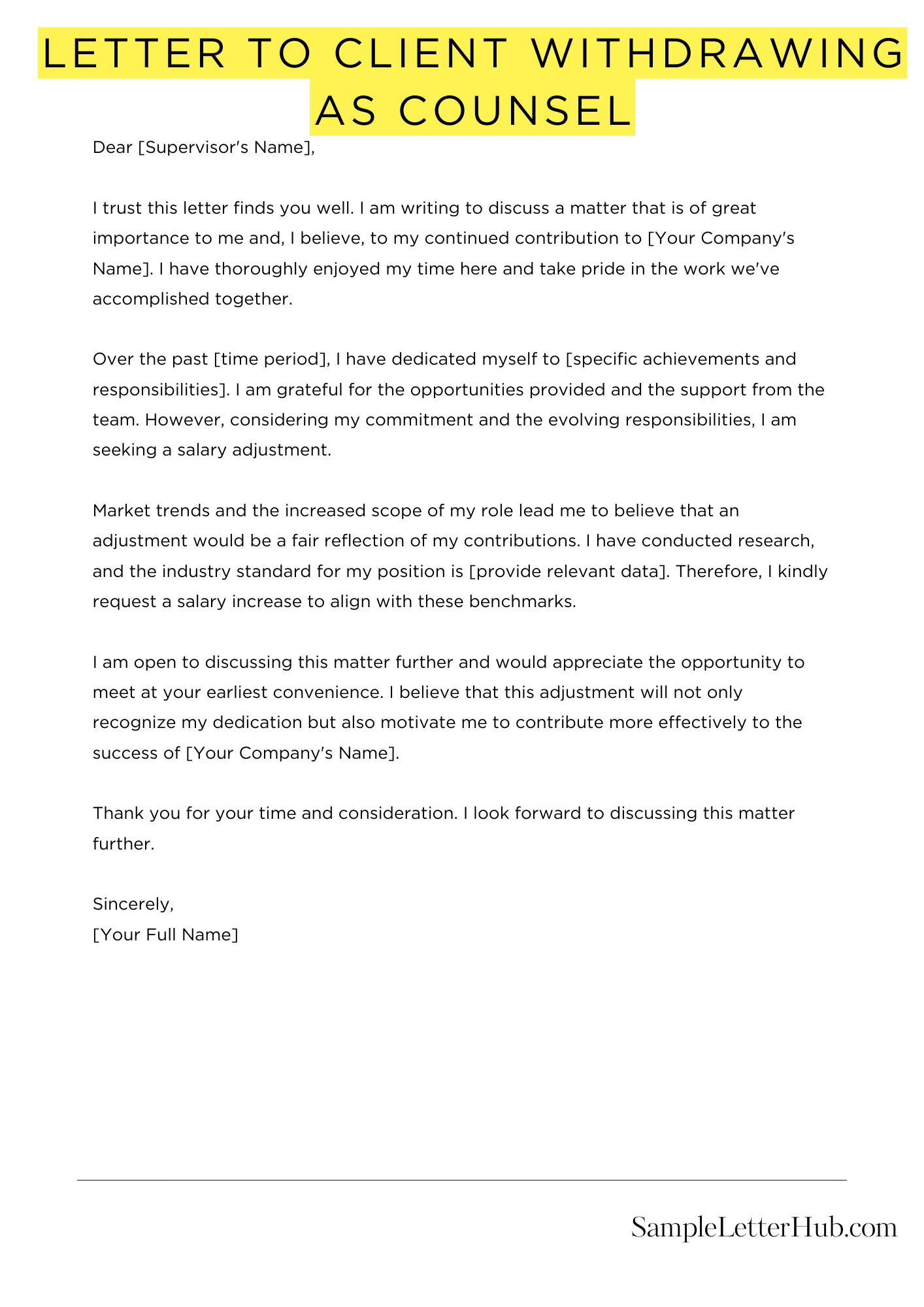A letter to a client withdrawing as counsel is a formal document that an attorney sends to a client to inform them that they are withdrawing from their representation. This letter outlines the reasons for the withdrawal and the steps that the client needs to take to find new counsel.
In this article, we will share templates, examples, and samples of letters to clients withdrawing as counsel. These samples will provide you with the language and structure you need to draft your own letter. We will also provide tips on how to write a clear and concise letter that will protect your interests.
Please note that these samples are for informational purposes only and should not be used as a substitute for legal advice. If you have any questions about withdrawing as counsel, please consult with an attorney.
Letter To Client Withdrawing As Counsel
Dear [Client Name],
I am writing to inform you that I will be withdrawing as your legal counsel in the matter of [Case Name]. This decision was not made lightly and is the result of careful consideration.
Over the past [Number] months, I have dedicated myself to providing you with the best possible legal representation. However, recent developments have made it clear that our professional relationship is no longer tenable.
Specifically, I have concerns about [State concerns briefly]. These concerns have led me to the conclusion that I can no longer effectively represent your interests.
I understand that this news may come as a disappointment, and I want to assure you that I do not take this decision lightly. I have always valued our professional relationship and wish you the best in your future endeavors.
I will take the necessary steps to ensure a smooth transition of your case to new counsel. I will provide you with a copy of all relevant case files and will be available to answer any questions you may have.
I wish you all the best and thank you for the opportunity to represent you.
Sincerely,
[Your Name]

How to Write Letter To Client Withdrawing As Counsel
Writing a letter to a client withdrawing as counsel can be a difficult task. However, it is important to do so in a professional and respectful manner. Here are some tips on how to write a letter to a client withdrawing as counsel:
1. State Your Intention Clearly
The first step is to state your intention to withdraw as counsel clearly and concisely. You should also state the effective date of your withdrawal.
2. Explain Your Reasons
If you are withdrawing for ethical reasons, you should state those reasons in your letter. However, you do not need to provide a detailed explanation of your reasons for withdrawing.
3. Offer to Help with the Transition
If possible, you should offer to help your client with the transition to new counsel. This could include providing a list of potential attorneys or helping to prepare a handover document.
4. Return Client Property
You should also return any client property that you have in your possession, such as files, documents, and money.
5. Keep a Copy of the Letter
It is important to keep a copy of the letter for your records. You may also want to send a copy of the letter to the court.
6. Be Professional and Respectful
Even though you are withdrawing as counsel, it is important to be professional and respectful in your letter. Thank your client for their business and wish them well in the future.
7. Get Legal Advice
If you are unsure about how to write a letter to a client withdrawing as counsel, you should consult with an attorney.</ An attorney can help you draft a letter that is both professional and legally compliant.
FAQs about Letter To Client Withdrawing As Counsel
What are the grounds for withdrawing as counsel?
There are several grounds for withdrawing as counsel, including a conflict of interest, a breakdown in the attorney-client relationship, or the client’s failure to pay legal fees.
What are the ethical obligations of an attorney who is withdrawing as counsel?
An attorney who is withdrawing as counsel has several ethical obligations, including the duty to provide the client with written notice of the withdrawal, the duty to take reasonable steps to avoid foreseeable prejudice to the client, and the duty to refund any unearned fees.
What should be included in a letter to a client withdrawing as counsel?
A letter to a client withdrawing as counsel should include the following information: the date of the withdrawal, the reason for the withdrawal, the effective date of the withdrawal, and the attorney’s contact information.
What are the consequences of withdrawing as counsel?
The consequences of withdrawing as counsel can vary depending on the circumstances, but may include the client’s right to seek a new attorney, the court’s imposition of sanctions, and the attorney’s loss of fees.
What are the alternatives to withdrawing as counsel?
There are several alternatives to withdrawing as counsel, including mediation, arbitration, and seeking a court order to compel the client to comply with their obligations.

